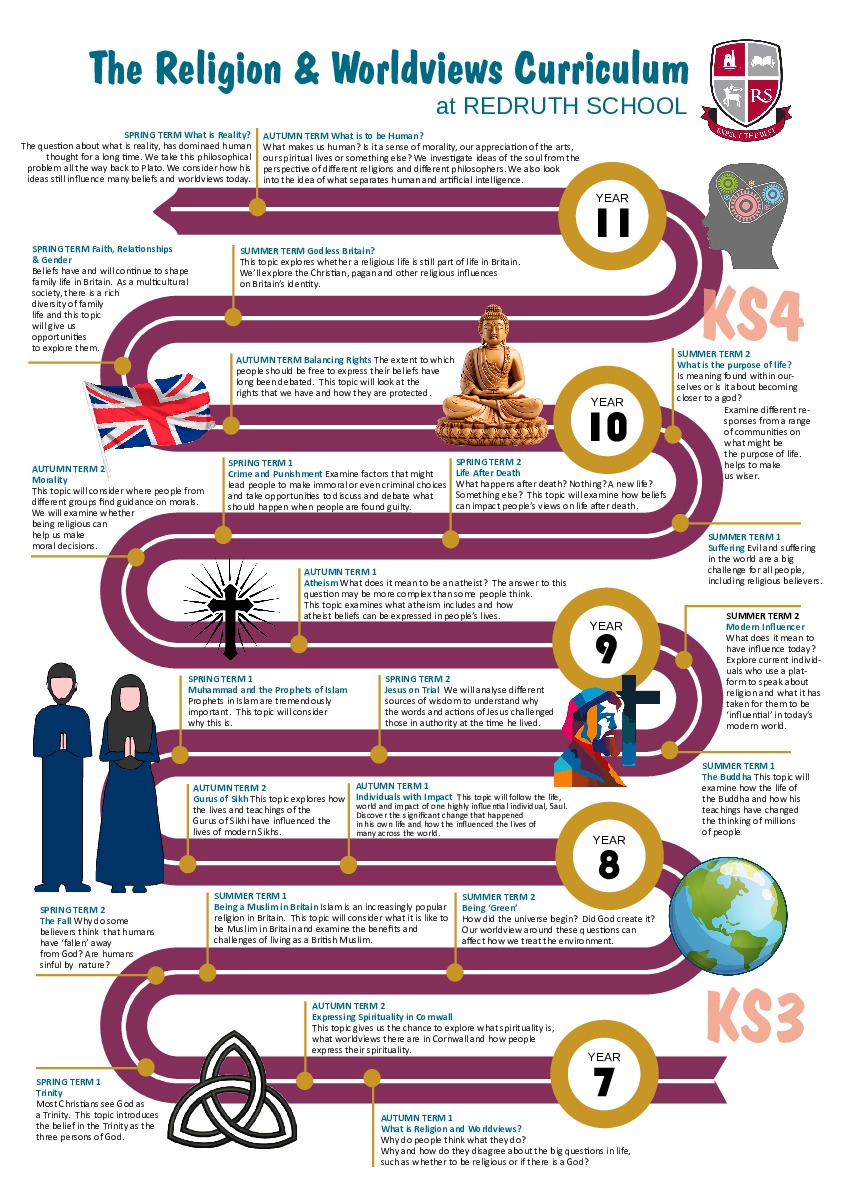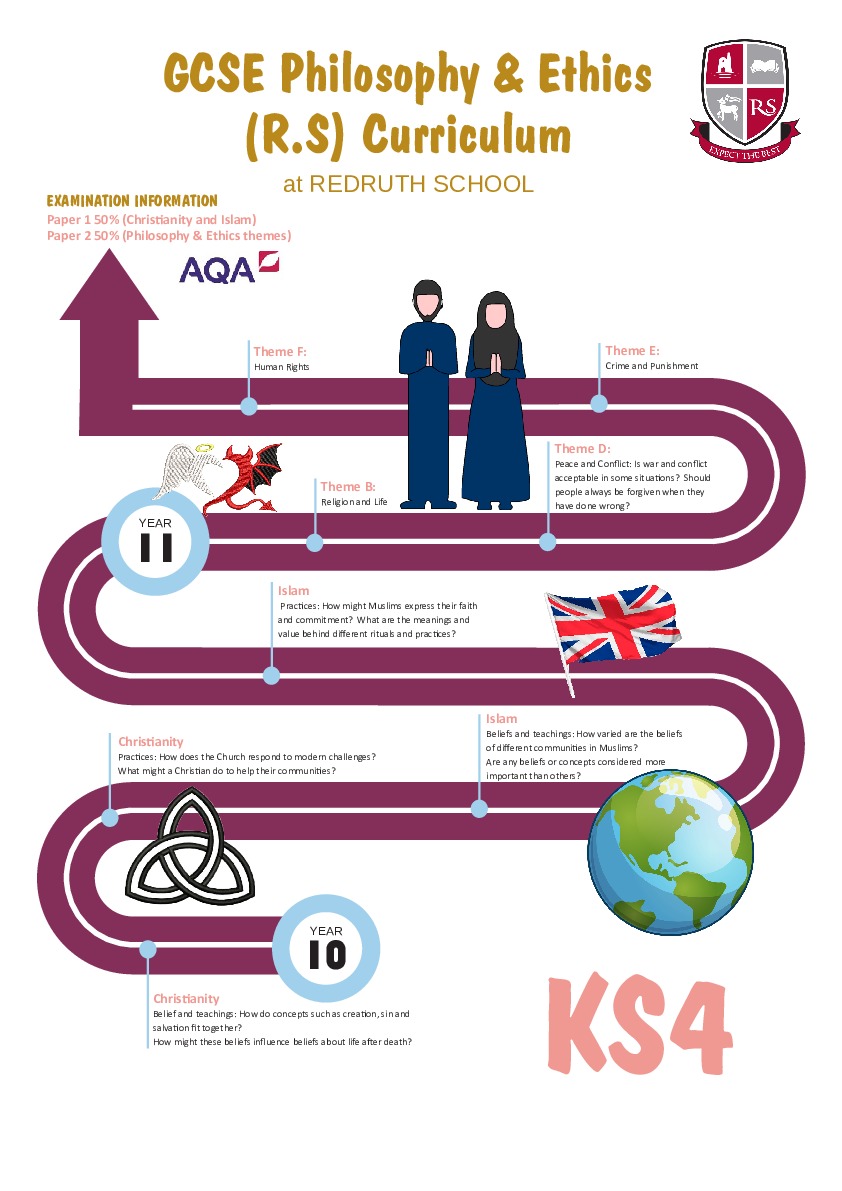- facebookShare this page on Facebook
- twitterTweet this page
- pinterestPin this page
Religion and World Views
Head of Subject: Mrs Suzannah Strong
sstrong@redruth.cornwall.sch.uk
Religion and World Views Curriculum Intent
Religion and Worldviews is a subject which asks students to explore their understanding of some of the biggest questions we ask ourselves in Theology, Philosophy and Ethics. Questions such as how do we know right from wrong? Does God exist? Is there an afterlife? What is it to be human?
The subject also enables students to learn about the world and the people within it. For students, the intent of the curriculum is broken down into three parts.
- Learning about yourself – we all have a worldview which shapes the way we understand, experience and respond to everything around us. It is influenced by our upbringing, our past experiences and where we live. Students consider their own positionality on a variety of topics.
- Learning about people – this element gives students the opportunity to expand their understanding beyond their own personal experiences and to foster an attitude of respect towards different individuals and communities.
- Learning about the world – understanding the beliefs, attitudes and practices that are integral in shaping the ideas and cultures that exist across the world today.
Religion and Worldviews is taught across all year groups, as outlined in the National Curriculum and Cornwall Agreed Syllabus for Religious Education.
Students will be supported in making high quality and appropriate use of specialist vocabulary and developing their literacy and oracy skills to allow them to speak and write academically within the subject. Alongside communication skills, students should develop skills of research, analysis, evaluation and empathy.

What does the Religion and World Views Key Stage 3 curriculum look like?
In Key Stage 3, students have two lessons in the two-week cycle. The curriculum follows the Cornwall Agreed Syllabus and is designed to build upon prior knowledge and skills from Key Stage 2 and to prepare students for study in Key Stage 4.
Year 7
What is a Worldview? Exploring different worldviews and considering where our own beliefs and values sit
Expressing Spirituality in Cornwall includes participation in the NATRE Spirited Arts Award)
The Trinity – analysing the Christian understanding of God
The Fall – what is the significance of this event for Christians?
Being Muslim in Britain Today – explores what is it like to be Muslim in modern Britain and what challenges there may be
Being ‘Green’ – looks at different beliefs, attitudes and responses to caring for our planet
Year 8
Individual of Impact – an in depth study of an individual who's life-changing experience changed the course of religion and belief
The Gurus of Sikhi – understanding how the concept of 'Guru' influences the lives of Sikhs today
Muhammad and the Prophets of Islam – What does it mean to be a prophet and why is it so important in Islam?
Jesus on Trial – what was so controversial about the life and teachings of Jesus that he was arrested and put on trial?
The Buddha – How has the Buddha influenced the concept and practice of Sangha?
Modern Prophets – Some people have changed the world and the way we think. What does it mean to be an 'influencer'?
Year 9
Atheism – Examining what being an atheist might mean to different people. Exploring diversity within atheism
Morality – What ethical principles do people use to guide them in moral decision-making? AIs any approach better than another?
Crime and punishment - What does society do when people are immoral and do not follow the rule of law?
Life After Death – To what extent do our lives impact upon any life after death?
Suffering – Why do people suffer? Does it compromise a belief in God?
Happiness – Does any belief system hold the secret to happiness?
What does the Religion and World Views Key Stage 4 curriculum look like?
All students continue to study Religion and Worldviews in Key Stage 4, following National Curriculum guidance. As well as the core Religion and Worldviews programme of study, students have the option to take the subject as a GCSE. The following information outlines both the Core Programme and the GCSE we deliver at Redruth School. The core programme is designed to both build upon prior topics but also complement the GCSE. Though the GCSE is specifically a course which supports further study at A Level, the core programme is also designed to give a helpful platform to next stage courses in religious studies and sociology A Level or philosophy/theory of knowledge in the International Baccalaureate Diploma.
Year 10 Core Programme
Balancing Rights – students consider human rights issues through philosophical and religious perspectives.
Faith, Relationships and Gender- understanding how diverse beliefs can affect attitudes and actions in interpersonal relationships and gender issues.
Godless Britain? – This topic asks where the place of religion is in Britain and what influence does it still hold over us as a nation.
Year 11 Core Programme
What is it to be Human? – Students learn a variety of responses to this question that has consistently perplexed thinkers. They evaluate ideas from the fields of philosophy, theology and science and consider these against the modern context of a world with AI.
What is Reality? – Students are given an introduction to the philosophical fields of metaphysics and epistemology, studying ancient thinkers such as Plato and considering why these questions continue to fascinate us (and filmmakers) alike.
GCSE AQA Religious Studies
Students can opt to take this two-year GCSE course which covers a range of religious, philosophical and ethical topics. The course requires students to prepare for two examination papers. Both papers last 1h45 and are equally weighted at 50%. Students take both of these exams in the summer term of Year 11.
Paper One is the Study of Religions – at Redruth School we focus on Christianity and Islam.
Paper Two is Religious, Philosophical and Ethical Studies and comprises four themes where students apply their understanding of religious beliefs, teachings and practices to a series of issues.
Below is the outline of when the topics are delivered and the course content.
Year 10
Theme C – The Existence of God and Revelation
Religious and philosophical responses to what is meant by the nature of God and the evaluation of arguments for the existence of God.
Christianity – Beliefs and Teachings
Students learn key teachings and beliefs such as Trinity, life after death, the life and teachings of Jesus, sin and salvation.
Christianity – Practices
Students learn practices such as prayer, worship, festivals and faith in action through charitable endeavours.
Islam – Beliefs and Teachings
Students learn key teachings such as the nature of Allah, Tawhid and differences in belief between Sunni and Shi’a Islam.
Islam – Practices
Students learn Islamic practices such as the Five Pillars in Sunni Islam and the Ten Obligatory Acts in Shi’a Islam.
Year 11
Theme B – Religion and Life
Study of matters around sanctity and quality of life issues such as caring for the planet, animal rights and rights issues related to both abortion and euthanasia. As well as understanding different perspectives, students need to know the UK law and have an awareness of related case studies.
Theme E – Religion, Crime and Punishment
Study of issues surrounding causes of crime, the nature of crime, the treatment of those who commit crime and the concept of forgiveness. This topic also looks at arguments for and against the death penalty.
Theme F – Religion, Human Rights and Social Justice
Study of prejudice, discrimination, and responses to human rights issues from several perspectives. The topic also explores social justice matters related to wealth, poverty and how people of faith respond.
After the course content is completed, students will have guidance specific to revision and examination techniques.
How can you support Religion and World Views Learning at home?
You can support at home by discussing some of our topics, often stories related to religion and worldviews, particularly more ethical topics, crop up in the news and can make for interesting discussions and debates. Students used to discussing at home often bring that confidence to the classroom.
There are also several websites that support the subject, the closest in content being the BBC Bitesize pages. There is one for KS3 KS3 Religious Studies - BBC Bitesize and one for the GCSE GCSE Religious Studies - AQA - BBC Bitesize. For GCSE our focus religions are Islam and Christianity.



